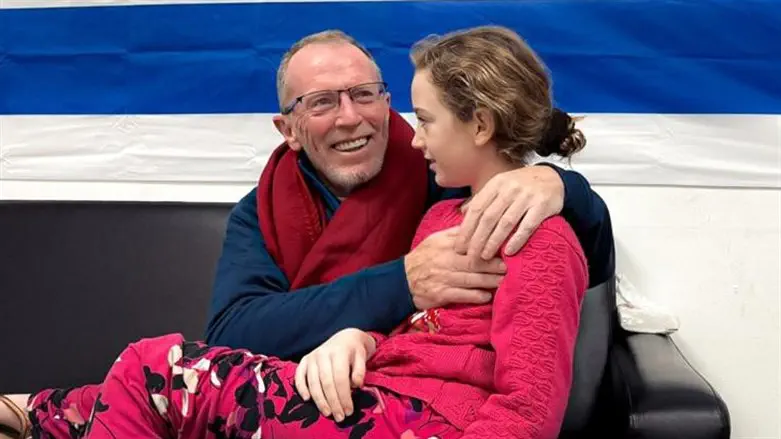
Thomas Hand, the father of Emily Hand, who was nine years old when she was kidnapped during the October 7 massacre and spent 50 days as a hostage in Gaza, said that he would "hesiate" to return to Ireland given the country's moves against Israel in the war against the Hamas terrorist organization.
“They were really instrumental in getting Emily back – they did a hell of a lot,” Hand, who together with Emily is a dual Irish-Israeli citizen, said of the Irish government in an interview with Jewish News this week.
“Within a few days of finding out that Emily wasn’t dead but kidnapped, the first trip we took was to Ireland," he said. "We met with the Prime Minister, president and lots of MPs – it was purely a political visit to make them put pressure on Hamas and they definitely did.”
While he is grateful for Ireland's help in getting his daughter back, Hand said that he is hesitant to return to Ireland now, as he believes the government is doing “too many anti-Israel things.”
He criticized Ireland for its decision to recognize a Palestinian state in the aftermath of the October 7 massacre and while Hamas continues to hold 100 hostages in Gaza.
“Recognising Palestine as a state, very soon after their massive terrorist attack – it was almost a reward,” he said. “They must have seen all the atrocious videos that Hamas put online themselves and yet they were recognised. For me personally, it looked like they were being rewarded for what they did.”
Hand said that he was not happy with Israel's decision to close its embassy in Ireland, but he understands why Israel made that decision. "I guess they had to show some kind of sign that we’re not very happy with the decisions being made by the Irish government," he said. In fact
The reason he would "probably hesitate" to return to Ireland now is that he fears for his own safety in Ireland due to the current anti-Israel and antisemitic environment. “I’m pretty well recognised nowadays. I could be very easily attacked."
Israeli Foreign Minister Gideon Sa'ar announced the closure of Israel's embassy in Ireland on December 15.
The Israeli ambassador to Dublin was recalled to Israel following Ireland's decision to unilaterally recognize a "Palestinian state" in May.
Earlier this month, Ireland announced that it was joining the South African court case against Israel at the International Court of Justice (ICJ), accusing Israel of "genocide." In its announcement, the Irish government said that it would ask the ICJ to expand its defnition of genocide to find Israel guilty.
"By legally intervening in South Africa’s case, Ireland will be asking the ICJ to broaden its interpretation of what constitutes the commission of genocide by a State. We are concerned that a very narrow interpretation of what constitutes genocide leads to a culture of impunity in which the protection of civilians is minimised," Tánaiste Taoiseach Micheál Marti said.
Sa'ar said following Ireland's moves, "The actions and antisemitic rhetoric that Ireland has adopted against Israel are based on the delegitimization and demonization of the Jewish state and on double standards. Ireland has crossed all red lines in its relations with Israel. Israel will invest its resources in promoting bilateral relations with countries around the world, according to priorities derived also from the attitudes of different countries towards it."
"There are countries that wish to strengthen their ties with Israel and do not have an Israeli embassy to date. We will amend the diplomatic framework of Israel’s representations, while giving weight, among other things, to the attitude and actions of different countries towards Israel in the political arena."

